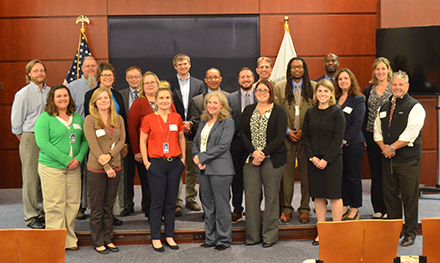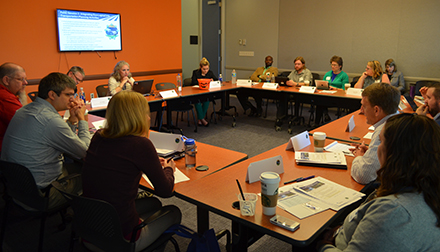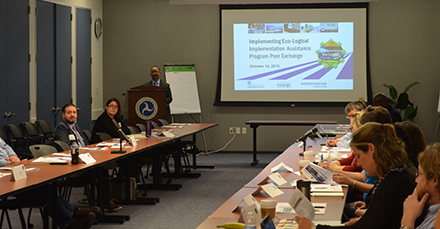Implementing Eco-Logical Implementation Assistance Program (IAP) Peer Exchange | October 14-15, 2015
Activity Report
The Federal Highway Administration (FHWA) and the American Association of State Highway and Transportation Officials (AASHTO) are jointly leading an effort to develop tools and resources for State Departments of Transportation (DOTs) and other agencies that are interested in Implementing Eco-Logical into their programs. This activity report summarizes the discussions held at the Implementing Eco-Logical Implementation Assistance Program (IAP) Peer Exchange, held at the U.S. Department of Transportation in Washington, D.C., on Wednesday and Thursday, October 14 and 15, 2015.
Peer Exchange

The peer exchange included sessions for IAP recipients (noted with * below) to share accomplishments and lessons learned from their projects. Additional sessions included facilitated discussions on the Future of Eco-Logical, Integrating Eco-Logical into Transportation Planning Activities, Transforming Eco-Logical into “Business as Usual,” and Lessons Learned, Benefits, and Best Practices of Applying the Steps of Eco-Logical.
Participants included Alabama DOT, Atlanta Regional Commission,* Charlottesville Albemarle MPO,* Federal Motor Carrier Safety Administration, Louisiana DOT, Maine DOT,* Michigan DOT,* Mississippi DOT, North Central Texas COG,* Ohio-Kentucky-Indiana Regional COG,* Tennessee DOT, Wisconsin DOT, U.S. Environmental Protection Agency, U.S. Forest Service, and U.S. Fish & Wildlife Service.
Peer Exchange Agenda

Implementing Eco-Logical Program Overview
Remarks from FHWA Leadership
Recognition of IAP Recipient Accomplishments
Panel Session 1: Getting Started with Partnerships
Wood Hudson, Charlottesville Albemarle MPO
Judy Gates, MaineDOT
Margaret Barondess, Michigan DOT
- Identifying and prioritizing agencies for partnerships
- Partnership success stories and overcoming common challenges in collaboration
Panel Session 2: Best Practices for Eco-Logical Data Collection and REFs
Kofi Wakhisi, Atlanta Regional Commission
Nathan Drozd, North Central Texas COG
Travis Miller, Ohio-Kentucky-Indiana Regional COG
- Easiest and most challenging aspects of data collection within Eco-Logical
- Best practices for data collection to meet the needs of both agencies and partners
- Advantages of using a REF when communicating data concepts to stakeholders
- Strategies and additional resources for better data collection and mapping
Full Group Discussion: Future of Eco-Logical
- Current and future (5-10 years) challenges and opportunities of the Eco-Logical approach
- Examples of the value of the Eco-Logical approach
- Identifying gaps in the Eco-Logical approach
- Future advancements that can be made
Panel Session 3: Integrating Eco-Logical into Transportation Planning Activities
- Process changes and how to incorporate Eco-Logical steps within an organization
- Identifying the people and policies that influence transportation planning
- Barriers to adopting REFs and Eco-Logical principles
Full Group Discussion: Transforming Eco-Logical into “Business as Usual”
- Opportunities to integrate Eco-Logical into business practices
- Necessary steps and potential challenges for implementation of Eco-Logical
- Definition of what a successful integration would look like
Full Group Discussion: Lessons Learned, Benefits, and Best Practices of Applying the Steps of Eco-Logical
- Challenges that agencies face when applying the Eco-Logical approach
- Recommendations for ways to overcome these challenges
Session Summaries

Day 1
Panel Session 1: Getting Started with Partnerships
Wood Hudson, Charlottesville Albemarle MPO (CAMPO)
Mr. Hudson spoke to his agency’s ability to obtain the ten datasets for their REF, which is used both by policy makers and for scoring projects. He described stakeholders’ initial concerns with providing information about threatened and endangered species (for example, bald eagle nest locations). The agencies wrote up a data sharing agreement and agreed to a scale that was more landscape-level than the MPO would have preferred for urban projects. His advice for the group was to use the highest resolution dataset when creating the REF. Overall CAMPO’s Eco-Logical process helped restore external stakeholders’ trust in the MPO and save time (18 months versus a normal 20-year process).
Judy Gates, Maine DOT
Ms. Gates explained that the DOT looked internally at how their current project screening process compared to the Eco-Logical steps. Although it was similar, MaineDOT moved risk assessment and alternatives analysis earlier, and they will be looking into steps 6 through 8 in the future. Ms. Gates shared an anecdote about a salmon hatchery project where MaineDOT thought that they had partnerships in place and were surprised when their partner agency took a different action than had been agreed upon jointly. She warned the group that just when you think you have partnerships, beware that something can happen to make that relationship rocky.
Margaret Barondess, Michigan DOT
Ms. Barondess spoke to the keys to good partnerships. She explained recommended that agencies starting to implement Eco-Logical think strategically about with whom, and how, to communicate and partner. Ms. Barondess also observed that each partner will behave differently and will have different needs. She described how the DOT’s formal agreement with the Michigan Department of Natural Resources came from the top level of leadership and was really critical.
Panel Session 2: Best Practices for Eco-Logical Data Collection and REFs
Kofi Wakhisi, Atlanta Regional Commission
Mr. Wakhisi described ARC’s project as responding to an economically distressed area. The MPO wanted to link economic and environmental opportunities using social and environmental data, and to include lots of community outreach to help alleviate previous concerns about non-participation. Mr. Wakhisi discussed two data-related challenges: issues acquiring the data and the difference between State and regional data. The MPO is also considering adding data on equity issues in the target area.
Nathan Drozd, North Central Texas COG
Mr. Drozd described NCTCOG’s REF interactive mapping website that all partners can access. Agencies can draw a proposed road alignment and input shapefiles, and the software will determine and represent scores on the map, indicating the level of concern for a given resource. The map will include archaeological data as well. Mr. Drozd noted that NCTCOG historically had a simpler role as a planning organization; that has changed as new transportation authorizations have encouraged or required local and State governments to track resource data and take on an expanded role in NEPA.
Travis Miller, Ohio-Kentucky-Indiana Regional COG (OKI)
The purpose of the grant was to help OKI get to a mapped version of data from their existing tabular data. OKI developed agreements with each State Natural Heritage Database Authority and applied this data to the LRTP project scoring process. Mr. Miller spoke to challenges around data sharing, specifically that the Natural Heritage Database was hesitant to give location-based data. They brought in DOT experts on the NEPA process, learned the appropriate scale of data for transportation projects (2,000 feet), and consequently adjusted their data scale.
Full Group Discussion: Future of Eco-Logical
Dave Williams highlighted what FHWA has learned from the Eco-Logical program. Strong partnerships are key and carry over into other projects. Agencies need strong management support to institutionalize the Eco-Logical approach into their practices. Establishing formal agreements helps to build new relationships, strengthen old ones, and to set up boundaries and expectations. Quantifying results continues to be a challenge, yet without such results, it is hard to build a business case.
Participants shared challenges they have faced. They brought up the difficulty of tracking what they have avoided since tracking is not required and takes time and money. Next they discussed the challenge of quantifying costs and impacts of Eco-Logical work since currently those stories are mostly anecdotal. Participants requested that FHWA produce a fact sheet and give examples of quantification, including real life ideas. Some participants expressed concern about whether their work would continue in their absence, such as if that person were to leave their agency. In response to this concern, the group discussed the need for a champion or leader at their agencies to keep Eco-Logical alive, as well as the need to institutionalize the approach and processes so that the work could continue and would not be dependent on individual staff. The resource agencies explained that although staff want to get involved in early planning, they either do not have the authority, cannot work outside of a defined scale, see ecosystem scale as above and beyond, or they do not have the time and are told by their supervisors to focus on their more immediate job tasks. This remains a challenge.
Participants noted that the culture has been changing and that Eco-Logical-like practices are being incorporated more. Peer exchanges and conferences help not only to learn about others’ business practices but to expose new agencies to the kind of ecosystem level planning that they could be doing.
Day 2
Panel Session 3: Integrating Eco-Logical into Transportation Planning Activities
The group discussed the issue of the Eco-Logical brand not being prevalent but that the concepts of integrated planning resonate with people and are being done under different names. When staff use the term, “Eco-Logical,” others might not know what they mean. Participants remarked that some people instead call it “landscape” or “watershed.” An agency might not care if people call it Eco-Logical but the important thing is to brand it internally so that all parts of the agency (planning, environment, engineering, etc.) know about this type of approach.
In terms of awareness, the concepts are out there but some agencies don’t have a firm grasp on what Eco-Logical is and/or are not sure about implementation. The resource agencies explained that the idea of getting engaged early in planning makes sense but people don’t know what to do. One reason is that it is a different kind of work than being in the field or a biologist working with permits. Leadership might say that early planning sounds good but given budgets and workloads, the primary focus is to get permits out and staff are unable to get involved in Eco”Logical type work. The resource agencies have noticed that this problem persists across agencies unless there is a funded position that can focus on Eco-Logical type work.
The last topic that the group covered was decentralization. Several agencies explained that a challenge with Eco-Logical is that it might be championed by someone at a central office but then not absorbed by regional staff. Some States have so many districts that their approach might be different at each one.
Full Group Discussion: Transforming Eco-Logical into “Business as Usual”
The conversation began by participants discussing how Eco-Logical could have been around for 10 years and not already be “business as usual.” They discussed how having a business case would help make people want to “do” Eco-Logical. For example, the approach can be sold as a time-saver by sharing an agency’s success that using Eco-Logical helped reduce permit time from 90 days to 5 days. Some agencies explained that they have not been documenting benefits to tell that kind of story, either because they didn’t think about it or because they didn’t have the time early in the process (and by later in the process, they cannot accurately measure benefits). Participants again discussed that branding is a challenge for them and that they are not sure how to spread the word and bring in other partners. The last issue they raised was that some MPOs have small staff sizes and budgets and therefore do not have the resources to comprehensively implement Eco-Logical.
Full Group Discussion: Lessons Learned, Benefits, and Best Practices of Applying Steps of Eco-Logical
The last discussion of the peer exchange focused on participants’ reflections of the event and their next steps. They remarked on the value of hearing peer agencies’ success stories and getting perspective from different agency types. They also found the event to be an opportunity to think about big picture issues. Several grant recipients mentioned the theme of persistence and the need for Eco-Logical champions. Despite any challenges that IAP recipients encountered, the peer exchange attendees concurred that their investment in Eco-Logical has been worthwhile.
Helpful Reference Materials
A presentation PDF file (listed below) is available upon request. Please contact David Williams.
- Atlanta Regional Commission
Next Steps
The next steps for each of the attending DOTs are to bring back the information they learned from the peer exchange and apply it to their program. Contact information was shared so each attendee can follow up with their new DOT partner from the peer exchange.
Need to request technical assistance for your Eco-Logical program? Please submit a request.

